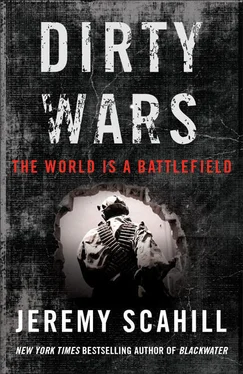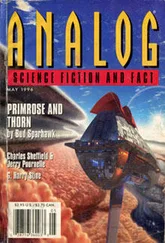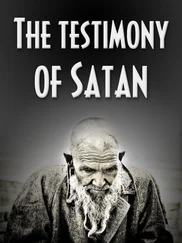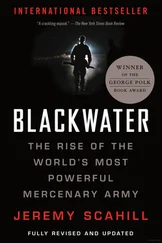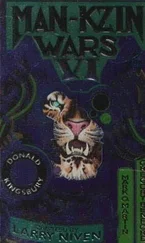President George H. W. Bush pardoned Cheney’s allies convicted in connection with Iran-Contra, and Cheney went on to serve as his defense secretary during the 1991 Gulf War, where he continued building his vision of a supremely powerful executive branch. During his time as defense secretary, Cheney began planting the seeds for another program that would aid the consolidation of executive supremacy, commissioning a study from the oil services giant Halliburton that laid out a plan for privatizing as much of the military bureaucracy as possible. Cheney realized early on that using private companies to wage US wars would create another barrier to oversight and could afford greater secrecy for the planning and execution of those wars, both declared and undeclared. Cheney would then go on to head Halliburton for much of the 1990s, spearheading a drive to create a corporate shadow army that would ultimately become a linchpin of his covert and overt wars when he returned to the White House in 2001. During the Clinton era, Cheney also spent time at the neoconservative American Enterprise Institute, developing a political and military agenda that could be implemented once his party resumed power. When President George W. Bush was inaugurated, Cheney became the most powerful vice president in history. And he wasted no time in driving to expand that power.
ON SEPTEMBER 10, 2001, a day before American Airlines Flight 77—a Boeing 757—smashed into the western wall of the Pentagon, Donald Rumsfeld stood in that very building to deliver one of his first major speeches as defense secretary. Two portraits of Rumsfeld hung inside—one of him as the youngest defense secretary in US history, the other as its oldest. September 11 had not yet occurred, yet Rumsfeld was at the podium that day to issue a declaration of war.
“The topic today is an adversary that poses a threat, a serious threat, to the security of the United States of America,” Rumsfeld bellowed. “This adversary is one of the world’s last bastions of central planning. It governs by dictating five-year plans. From a single capital, it attempts to impose its demands across time zones, continents, oceans, and beyond. With brutal consistency, it stifles free thought and crushes new ideas. It disrupts the defense of the United States and places the lives of men and women in uniform at risk.” Rumsfeld—a veteran Cold Warrior—told his new staff, “Perhaps this adversary sounds like the former Soviet Union, but that enemy is gone: our foes are more subtle and implacable today. You may think I’m describing one of the last decrepit dictators of the world. But their day, too, is almost past, and they cannot match the strength and size of this adversary. The adversary’s closer to home. It’s the Pentagon bureaucracy.” The stakes, he declared, were severe—“a matter of life and death, ultimately, every American’s.” Rumsfeld told his audience, consisting of former defense industry executives turned Pentagon bureaucrats, that he intended to streamline the waging of America’s wars. “Some might ask, How in the world could the Secretary of Defense attack the Pentagon in front of its people?” Rumsfeld told his audience. “To them I reply, I have no desire to attack the Pentagon; I want to liberate it. We need to save it from itself.” It would be dubbed by Rumsfeld and his team his “revolution in military affairs.”
Bush’s all-star foreign policy team had come into power with an agenda to radically reorganize the US military, to end what they characterized as the Clinton-era weakening of national defenses and to reenergize the drive for massive missile defense systems favored by Reagan and other Cold Warriors. As Rumsfeld’s deputy, Douglas Feith, recalled, “The threat of jihadist terrorism was on the list of U.S. government concerns at the start of the Bush administration in early 2001, but it got less attention than Russia did.” The focus on “terrorism” in the early days of the administration centered on the threats posed by nation-states—Iran, Syria, North Korea and Iraq—and enacting regime change. Cheney and Rumsfeld had spent much of the 1990s plotting out a course to redraw the maps of the Middle East, but it was not focused on the asymmetric threat al Qaeda and other terrorist groups posed. Iraq, not al Qaeda, was their obsession. “From the start, we were building the case against Hussein and looking at how we could take him out and change Iraq into a new country,” said former treasury secretary Paul O’Neill. “And, if we did that, it would solve everything. It was all about finding a way to do it. That was the tone of it. The President saying, ‘Fine. Go find me a way to do this.’” At the new administration’s second National Security Council meeting on February 1, 2001, Rumsfeld said bluntly, “What we really want to think about is going after Saddam.”
Ironically—for all of Rumsfeld’s bravado about the weakness of the Clinton era, and neocon charges that the Democrats had been asleep at the wheel watching al Qaeda—Rumsfeld himself was initially dismissive of the imminence of the threat posed by the group prior to 9/11. Journalist Bob Woodward detailed a meeting that reportedly took place on July 10, 2001, two months before the 9/11 attacks. CIA director George J. Tenet met with Cofer Black, the head of the CIA’s Counterterrorism Center (CTC), at Langley, Virginia. The two men reviewed current US intelligence on bin Laden and al Qaeda. Black, Woodward reported, “laid out the case, consisting of communications intercepts and other top-secret intelligence showing the increasing likelihood that al-Qaeda would soon attack the United States. It was a mass of fragments and dots that nonetheless made a compelling case, so compelling to Tenet that he decided he and Black should go to the White House immediately.” At the time, “Tenet had been having difficulty getting traction on an immediate bin Laden action plan, in part because Defense Secretary Donald H. Rumsfeld had questioned all the National Security Agency intercepts and other intelligence. Could all this be a grand deception? Rumsfeld had asked. Perhaps it was a plan to measure U.S. reactions and defenses.” After reviewing the intelligence with Black, Tenet called National Security Adviser Condoleezza Rice from the car en route to the White House. When Black and Tenet met with Rice that day, according to Woodward, they “felt they were not getting through to Rice. She was polite, but they felt the brush-off.” Black later said, “The only thing we didn’t do was pull the trigger to the gun we were holding to her head.”
Then the planes piloted by the 9/11 hijackers slammed into the Twin Towers and the Pentagon. It didn’t take long for Rumsfeld and his team to envision how the fight against terrorism didn’t undermine their Iraq plans but could actually provide the rationale to carry them out. Perhaps even more important, the post-9/11 moment allowed Rumsfeld, Cheney and their cohort to realize the ambitions they had long held for an all-powerful executive branch, with the virtually unlimited right to wage wars across all borders, justified in their minds by a global national security threat. The goals and plans that they had spoken of in hushed tones at unofficial gatherings would soon become the official policy of the United States.
As President Bush’s war team began planning for a response to the 9/11 attacks, Rumsfeld led the charge to put Iraq on the target list immediately. In advance of the September 15–16, 2001, weekend meetings Bush convened at Camp David, Feith drew up a memo for Rumsfeld that listed “the immediate priority targets for initial action” as: al Qaeda, the Taliban and Iraq. “The agenda was very clear from the night of 9/11,” General Hugh Shelton, at the time the chair of the Joint Chiefs of Staff and the most senior military adviser to President Bush, told me. He said that Rumsfeld and Wolfowitz immediately began pressing for an attack on Iraq. “We need to be going into Iraq. We need to go right now,” he recalled them saying. “Although there wasn’t one shred, not one iota of evidence that would say [9/11] was linked into Iraq,” Shelton said. “But yet, that drumbeat started that night. They didn’t like the fact that when I came up to the office that night with some plans that we had [to respond to 9/11] that none of them included the Iraq plans.” Richard Clarke said that on September 12, President Bush told him three times to look for “any shred” of evidence linking Iraq to the attacks. Wolfowitz sent a strategy memo to Rumsfeld arguing that “even a 10 percent chance that Saddam Hussein was behind the 9/11 attack” meant that “maximum priority should be placed on eliminating that threat.” Joining Shelton in the anti-Iraq invasion camp was one of his predecessors, General Colin Powell, the secretary of state. A decade earlier, during the Gulf War, Powell had clashed with Wolfowitz—at the time an undersecretary of defense—and the ideological civilian leaders at the Pentagon over their desire to send US troops all the way to Baghdad to overthrow Saddam. But Powell and traditional conservatives like former secretary of state James Baker and Brent Scowcroft won that debate. Now, with the 9/11 attacks fresh in everyone’s minds, Wolfowitz and the ideologues were certain they could achieve their goals.
Читать дальше
